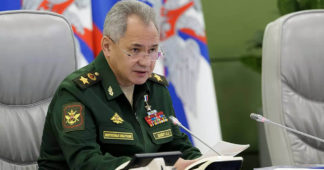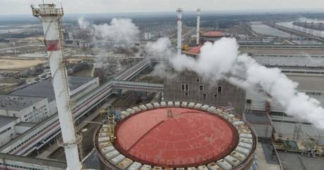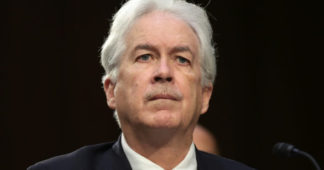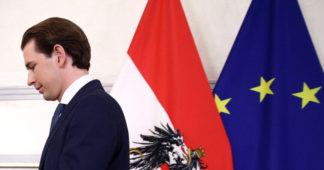Ashish Dangwal
A Russian senator has alleged that Ukraine and Pakistan recently discussed the technologies for developing nuclear weapons. The latest claim came after Russia ramped up its rhetoric regarding Kyiv’s alleged preparations to use a radioactive “dirty bomb.”
Igor Morozov, a Federation Council’s defense committee member, claimed that Ukrainian experts traveled to Pakistan and met with a delegation to discuss nuclear weapons technology, reported Russia’s state-owned news agency RIA Novosti.
The Russian lawmaker made the remarks during a news conference titled “Nuclear Provocations in Ukraine: Who Needs It?” as part of the special project “Ukrainian Dossier.”
Morozov argued that the ability of Ukraine to produce a “dirty bomb” is not a secret to anyone. However, he contends that lack of financing is the fundamental issue. Morozov stated, “the threat is real,” while discussing the potential for Ukraine to use a “dirty bomb” as a provocation.
The legislator added that the Tochka-U munition could be employed with a low-power nuclear charge. He also highlighted that without Congress’ approval, the United States president is permitted to use low-yield atomic bombs anywhere in the world.
Additionally, he did not completely exclude the possibility that Ukrainian president Volodymyr Zelenskyy discussed nuclear weapons with his British and American allies.
But the Russian politician offered no convincing evidence to support his claims. Islamabad was previously found sending weaponry and ammunition to Kyiv in the ongoing Russia-Ukraine conflict.
According to reports, M/s DMI Associates, an arms dealer located in Islamabad, has been in touch with M/s Defense Industry Group, a company based in Bulgaria, to make it easier for the Ukrainian government to obtain manufactured defense supplies.
In a similar development, it was discovered that the Ukrainian company M/s FORMAG, based in Kyiv, had contacted M/s Bluelines Cargo Pvt Ltd in Pakistan to supply gloves for the Ukrainian army.
According to Geo-Politik, the 122 mm high-explosive fragmentation artillery shells used by the Armed Forces of Ukraine (AFU) are produced in Punjab, Pakistan.
Russia’s Dirty Bomb Nuclear Rhetoric
Recently, there have been many contradictory messages in Russian rhetoric regarding the use of nuclear weapons. Sergei Shoigu, Russia’s defense minister, called his Western counterparts, alleging that Ukraine was getting ready to employ a radioactive “dirty bomb.”
However, President Vladimir Putin stated on October 27, following tactical nuclear exercises, that his military is not plotting a nuclear assault on Ukraine. Furthermore, the rhetoric surrounding “dirty bombs” is an established strategy.
In Syria, Russia alleged that rebel groups were responsible for such attacks even though they lacked expertise in chemical weapons.
The US, France, and Britain, three nuclear-armed states on the UNSC, stated that Russia’s accusations were “transparently false” in a joint statement. They believe that Russia may stage a “false flag” strike using a dirty bomb to justify using nuclear weapons while it is disadvantageous in eastern and southern Ukraine.
With repeated nuclear saber rattling, Russia may be hoping to discourage the West from getting directly involved in the conflict. Nevertheless, it’s unlikely that Ukraine would employ a “dirty bomb.”
A “dirty bomb” is a conventional bomb that disperses radioactive, biological, or chemical materials during an explosion. The term is frequently used interchangeably with radiological dispersal device (RDD), a weapon that uses radioactive elements.
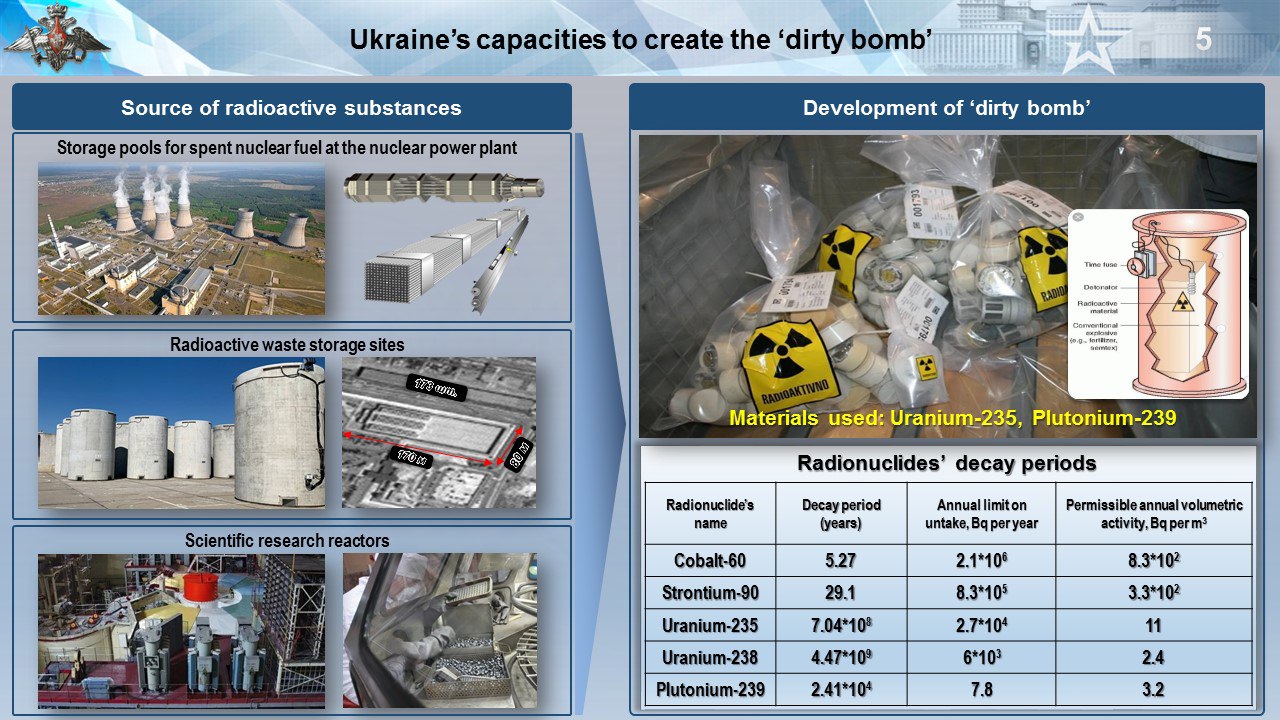
A dirty bomb comprises ordinary high explosives with a small amount of radioactive substance, such as Caesium-137.
The impact of long-term radiation exposure and the deaths and injuries brought on by the detonation of conventional explosives would be minimal. The Russia-Ukraine conflict can best be characterized as a limited war, given the limitations of both sides’ declared objectives.
Russia’s military objectives have been toned down, and Ukraine is attempting to recover its territorial integrity. On June 29, Putin declared that the “ultimate goal” of the ongoing war is “the liberation of the Donbas, the defense of its people, and the development of conditions which would guarantee the security of Russia itself.”
This showed a retreat from the objectives Moscow had stated in the early stages of the conflict. The initial goal was unequivocal consideration for Russia’s legitimate security interests, including recognizing Russia’s sovereignty over Crimea, accomplishing the demilitarization and denazification objectives, and maintaining the country’s neutrality.
Published at eurasiantimes.com
We remind our readers that publication of articles on our site does not mean that we agree with what is written. Our policy is to publish anything which we consider of interest, so as to assist our readers in forming their opinions. Sometimes we even publish articles with which we totally disagree, since we believe it is important for our readers to be informed on as wide a spectrum of views as possible.
